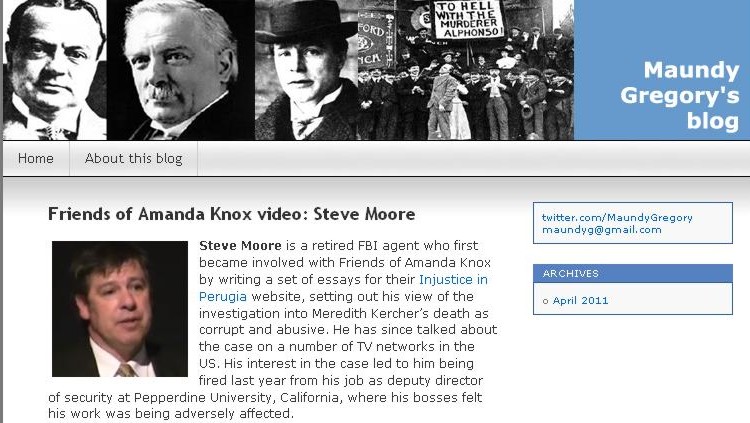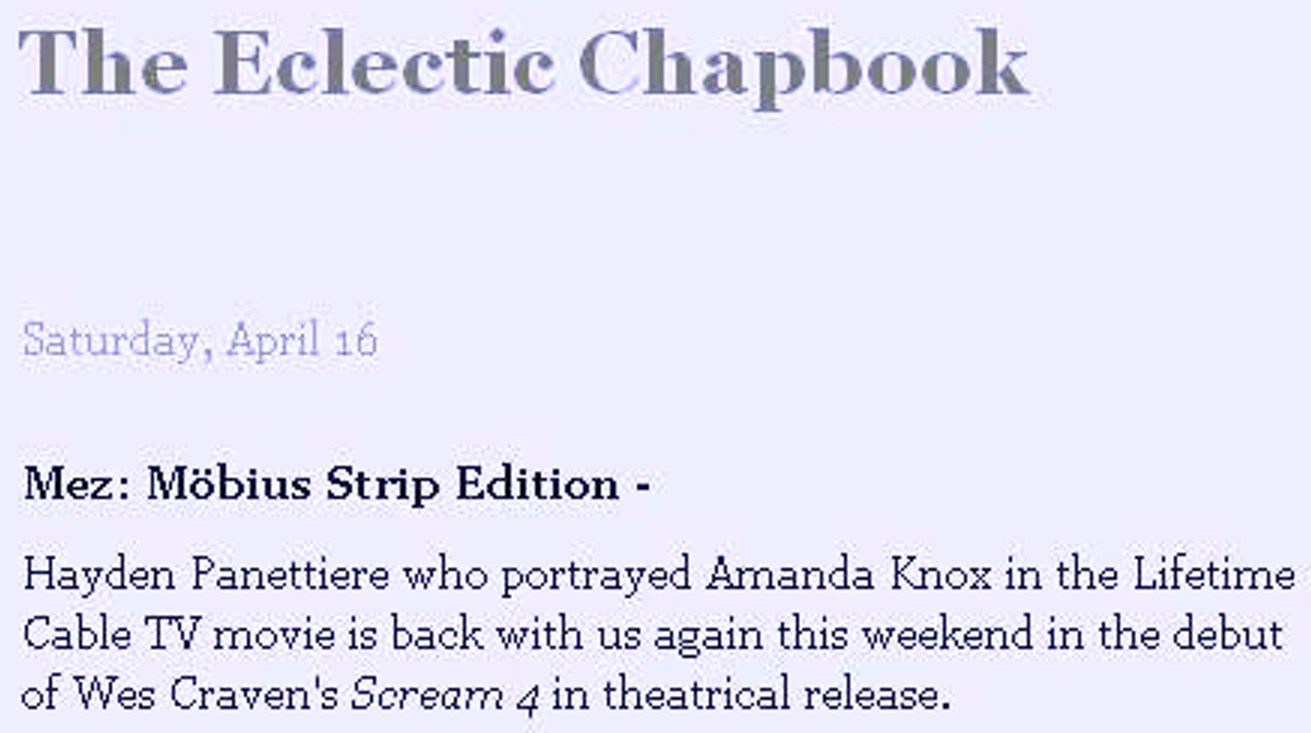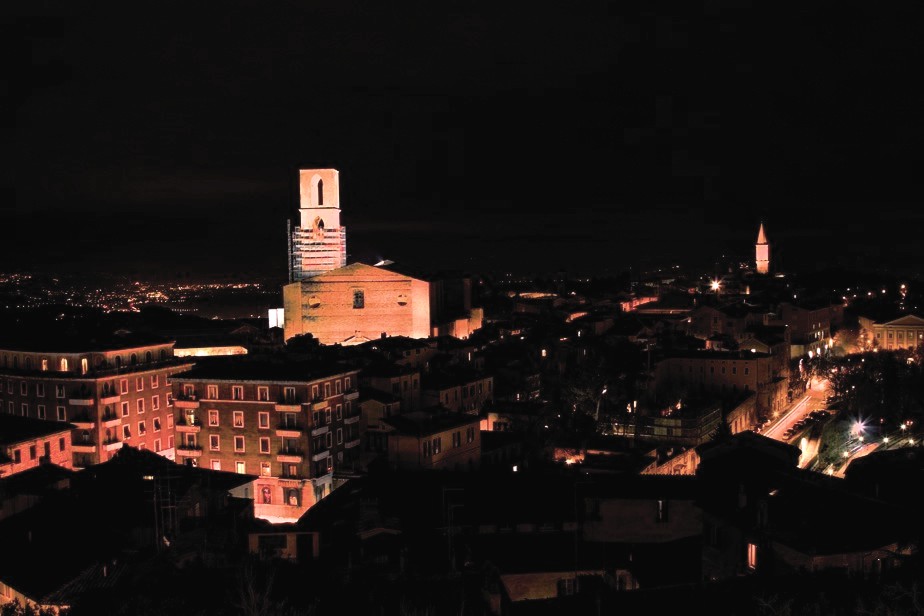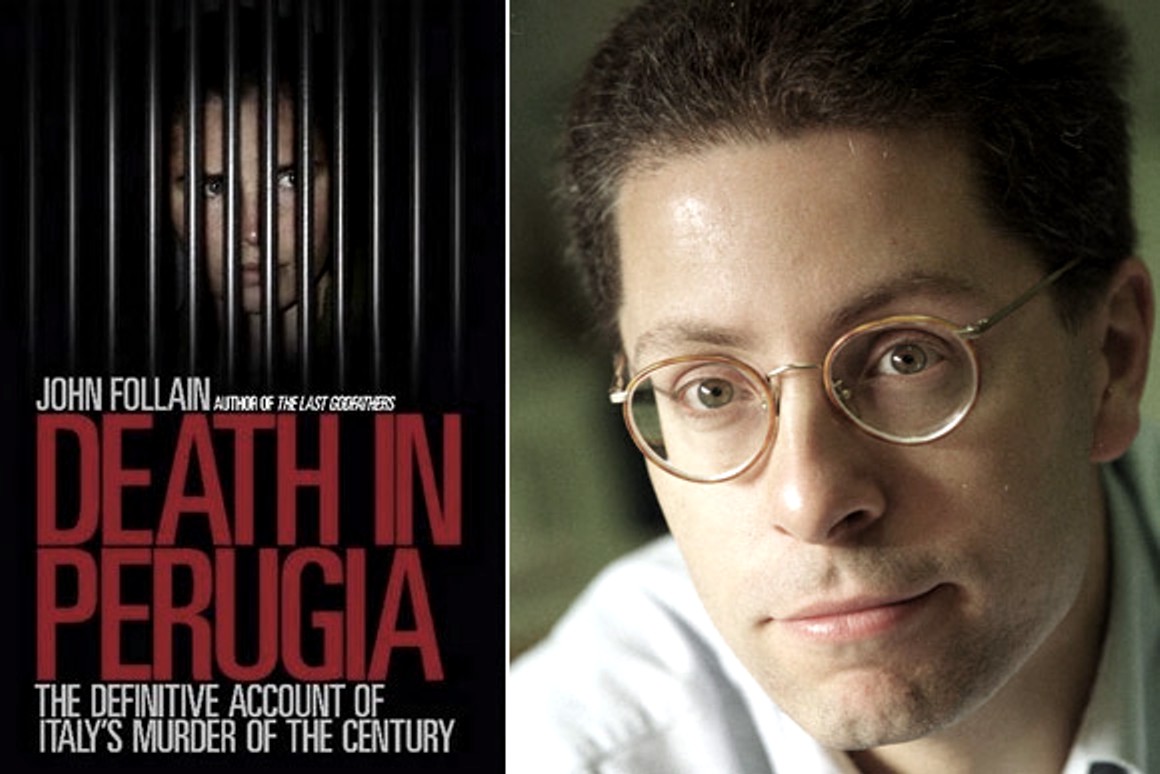
Category: Excellent reporting
Sunday, October 09, 2011
“Wrong To Capitalise On Any Murder. Not Just For Us, But For Anyone”
Posted by Peter Quennell

Helen Weathers reports on a face-to-face interview with Meredith’s father John in the Daily Mail.
On John’s memories of Meredith which haunt him daily:
“˜Meredith was extremely intelligent and humorous as a child. She had an almost adult sense of humour, and was always very thoughtful and considerate “” sensitive to other people,’ says John, who was divorced from Meredith’s mother in 1997 after 20 years of marriage.
“˜Meredith was very witty. She had quite an original line in humour, what you might call a barbed wit, I suppose, but not hurtful; never hurtful.
“˜I remember once coming back from a holiday in Egypt and showing Meredith a photograph of myself wearing a floppy sunhat I’d bought. She took one look and said: “Dad, just tell me you didn’t pay any money for that hat.”’
Amanda Knox cries following the verdict that overturns her conviction and acquits her of murdering her British roomate Meredith Kercher, at the Perugia court in ItalyLike her father, Meredith loved the relaxed Mediterranean way of life. Indeed, her love of Italy started on family holidays to Rimini and continued on school trips and exchanges. John was not surprised when she chose to study Italian and European studies at Leeds University.
“˜The irony was that after two years at Leeds she found they’d accidentally put her on a three-year course which would have excluded the year in Italy, so she fought to get put back on the four-year course and get out there,’ says John.
“˜She had the choice of going to Rome, Milan or Perugia. While she loved Rome and would have liked Milan, she felt she’d have a better chance of making friends more easily in Perugia than in a large city.
“˜Meredith was very excited about going. For the first three days she stayed in a small family-run hotel until she found the cottage. She told me her room was a bit small, but the views were beautiful.’
John last saw his daughter a month before she was murdered. She’d returned to Britain on a flying visit to buy some clothes for the Italian winter and arranged to meet her father for coffee at an Italian restaurant in Croydon.
“˜Meredith had bought a new pair of boots which she wanted to show me. I think they were leather with a small heel. And that’s the image of Meredith I want to remember: my daughter smiling, laughing and showing me her new boots.’
On the media speculation about the megabucks that Amanda Knox and her clan could make.
“˜I think it would be more sensitive to Meredith’s memory if Amanda Knox maintained a low profile,’ says John, a freelance journalist, in his first in-depth interview.
The Amanda Knox cult insults my Meredith’s memory: Victim’s father says it’s wrong to capitalise on murder in his first interview since the verdict
“˜I don’t want to say anything confrontational, but I believe it is wrong to capitalise on any murder. Not just for us, but for anyone.
“˜This cult of celebrity is demeaning to Meredith’s memory, disrespectful. I don’t think Amanda Knox has actively sought out celebrity status; I think that has been created for her. But then again, she hasn’t actively rejected it.
“˜It is distressing that all this will go on for a long time and that all the focus is going to be on the defendants for some time yet.
And at the shock of the U-turn first appeal verdict
“˜I thought the judge might uphold the conviction but possibly reduce their sentences to be more in line with Guede’s “” but not this,’ he says.
“˜We thought the original evidence would be upheld, so it is a huge shock. You hope the appeal jury is going to recognise what was established in the first trial. In this case, it wasn’t.’
Wednesday, October 05, 2011
Nancy Grace’s “Miscarriage Of Justice” Observation Goes Viral, Google Says It’s On 38,000 Sites
Posted by Peter Quennell

Amanda Knox will be lucky if CNN’s popular legal commentator Nancy Grace doesn’t get on her case the way she still is on Casey Anthony’s.
Nancy Grace says there is NO innnocent explanation for Knox’s second written confession placing her at the house (with Patrick Lumumba) and including observations that only someone who really was there could have known.
We have noticed that time and again commentators have come out batting for Knox, read the evidence, and then gone quiet. Nancy Grace’s CNN colleague Jane Velex-Mitchell had swallowed the Kool Aid at one point, but now she is ambivalent and careful.
Here is Huffington Post Media’s version of what Nancy Grace said last night.
Nancy Grace issued a typically blunt verdict on Amanda Knox during a Monday interview.
The outspoken HLN host and fierce ‘Dancing with the Stars’ competitor declared her true feelings about Knox when she spoke to Access Hollywood following her waltz performance Monday night.
“I was very disturbed, because I think it is a huge miscarriage of justice,” Grace said. “I believe that while Amanda Knox did not wield the knife herself, I think that she was there, with her boyfriend, and that he did the deed, and that she egged him on. That’s what I think happened.”
In Knox’s final plea, she told an Italian appeals court that she was not present the evening her British roommate Meredith Kercher was sexually assaulted and brutally murdered in their shared apartment. Grace said she did not think Knox is telling the truth. “I believe her original statement to the police - that she was there in the home when her roommate was murdered was true,” Grace told Access Hollywood.
Social networks like Twitter and Facebook exploded with celebratory messages on Monday as the judge proclaimed Knox’s innocence, allowing the study abroad student to finally return home to Seattle, Washington after four years in an Italian prison.
Grace was not one of those supporters, saying that while she would love to believe Knox innocent, “I just happen to know the facts.” Grace was even harsher when asked if her show would compete with other networks to get the first Knox interview.
“I’m not trying to get Amanda Knox’s first interview because”¦ my show does not pay for interviews…Second, I don’t think she’s going to tell the truth anyway, so what’s the point?” Grace responded.
THAT will get the noses of thousands of new followers firmly into the REAL evidence. Not all that made-up stuff. Other legal commentators may follow Nancy Grace’s lead, because she is the real pace-setter and power broker in that community.
The equally popular Fox News political and legal commentator Bill O’Reilly discussed the verdict on Monday night with Judge Andrew Napolitano, another prominent commentator. This is from the the summary on Bill O’Reilly’s website.
]Bill O’Reilly] concurred that Amanda Knox likely knows what happened on the night British student Meredith Kercher was murdered; therefore, we shouldn’t really be happy with this outcome since a terrible crime is unsolved.
Pity that Judge Napolitano claimed that Amanda Knox was interrogated as a suspect for 56 hours without an attorney. That did NOT happen. She had an attorney present at all times. Someone please correct him. .
Tuesday, October 04, 2011
The Guardian Publishes A Negative Take On Italian Justice Rather Poorly Researched
Posted by Peter Quennell
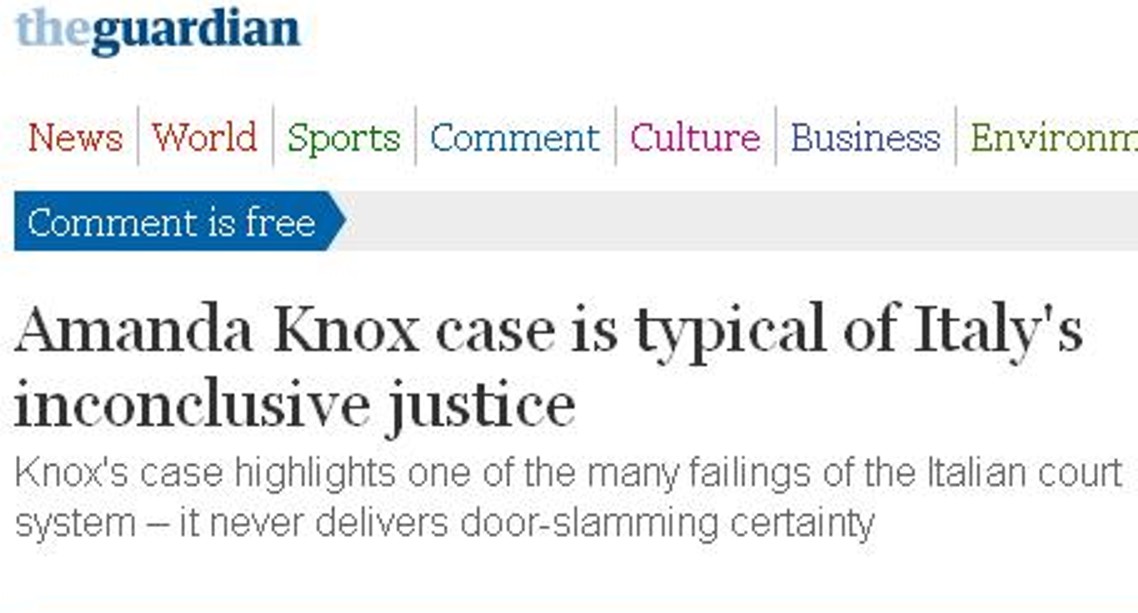
Click above for Tobias Jones’s take in the Guardian which seems to be trying to report evenly on the case..
Here are our most-read posts on first trials by Italian poster Nikki and the two appeals by Italian poster Commissario Montalbano and often-overlooked victims’ rights about Italian campaigner Barbara Benedettelli.
All explain better than Tobias Jones does the many hoops that prosecutors have to jump through for victims’ interests to come out ahead..
We can agree with Tobias Jones on this below - the elaborate, expensive and slow automatic first appeals complete with lay judges who don’t see the first pass of the evidence at first trial and often act as a wildcard in the process.
It’s one of the many failings of Italian justice that it never delivers conclusive, door-slamming certainty. What usually happens is that the door is left wide open to take the case to the next level, first to appeal and then to the cassazione, the supreme court. The score in the public imagination, at the moment, is simply one-all.
It’s always been that way. There’s barely one iconic crime from the post-war years that has persuaded the country that, yes, justice has been done: the murder of Pier Paolo Pasolini, the Ustica crash, the Bologna railway station bombing, the Piazza Fontana atrocity, the Monster of Florence murders, the murder of Luigi Calabresi, the “caso Cogne” “¦ none has ever been satisfactorily, convincingly resolved. Instead the country seems to split into innocentisti and colpevolisti (those who believe in the innocence or guilt of the accused) and the heated debates continue for decades.
But we’d agree less-so, at least from an American perspective, with the Italian uniqueness of this below.
Dietrologia ““ literally “behindery” or conspiracy-theorising ““ is a national pastime precisely because the courts don’t offer convincing verdicts. It allows every journalist, magistrate and barfly to try their hand. The result is that everyone with an active imagination has a go at explaining the truth behind the mystery, and inevitably the truth only gets further buried beneath so many excited explanations. The media plays an active role in keeping the circus going: in no other country are cronache nere ““ “black chronicles” ““ so much the mainstay of the evening news. There’s always a case on the go.
Tobias Jones should watch the urbane elegance of the Porta a Porta shows, which are reminiscent of human games of chess, and then visit the US and watch all the cable news channels devoting many hours a day to legal talking heads debating one another over high-profile crime cases. CNN and MSNBC could probably not survive without them (Casey Anthony was a godsend) and they go back to the OJ Simpson trial when it seemed half the country joined in.
He probably has a good point about subjudice (blackouts on court news in the UK) but there’d seem more chance of a wrong outcome driven by public opinion in the US with its elected judges and police chiefs and prosecutors angling for news exposure than in Italy. (Judge Michael Heavey is an elected judge.)
Local public opinion in the US is very much behind the high execution rate in several American states and the difficulties non-whites often have in getting off.
Monday, October 03, 2011
Million Dollar Campaign And American Media Come Under Intense Ridicule By An Influential Italian
Posted by Tiziano
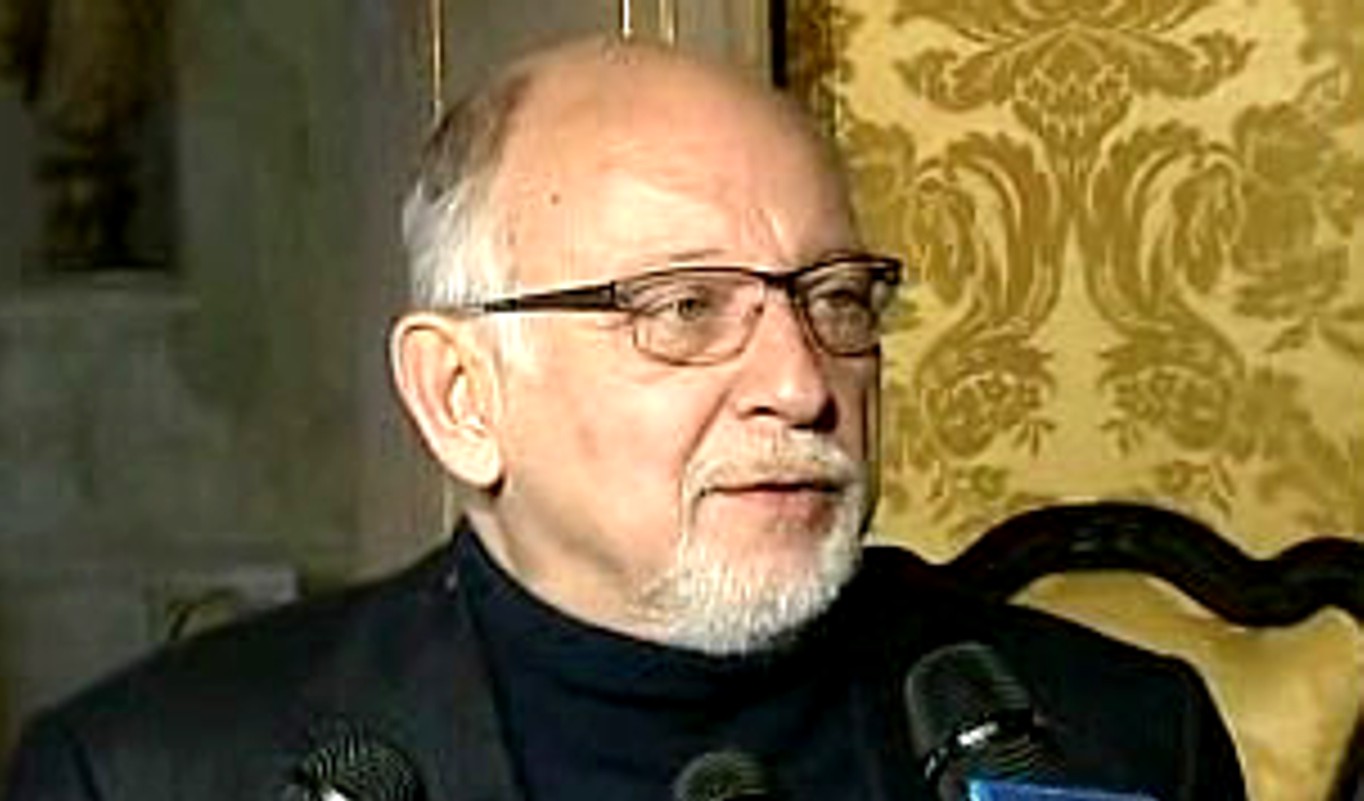
Vittorio Zucconi is the US editor of the major daily La Republicca and lives in Washington. He has more influence over Italian perceptions of America than any other. This is translated from the Italian.
A few hours from the verdict, America is in a trance over Baby Amanda - she is the girl from the golden west, an innocent victim of the wicked witches of the east, the ones wearing the robes of the Perugian judges - now awaiting the happy ending that everyone is expecting, which legions of correspondents and American TV cameras talk about and recount, as if the fate of the west depended upon her release from prison on appeal or on the confirmation of the guilty verdict
By Vittorio Zucconi per la Repubblica
She is the “Girl from the Golden West”, the innocent victim of the wicked witches of the east, the ones who wear the robes of the judges from Perugia. It is a melodrama, sung, played and staged for an American audience which relishes it and avidly follows it like a soap opera or one of those legal thrillers which have made the fortune of of authors like Grisham, Turow and before them Earl Stanley Gardner.
Amanda like Puccini’s Minnie, is the snow-white, naive, extremely innocent girl imprisoned on the wild frontier of the Italian justice system, now awaiting the happy ending which everyone expects, which legions of correspondents and TV cameras tell of and which are preparing to recount as if the fate of the West depended on her release form prison on appeal or on the confirmation of her guilty verdict. And which networks like the ABC are already selling for $7.99 to be downloaded to I-pads and tablets.
Such a show of strength, such a shelling out of money on the part of “news organisations”, all now very careful down to the last cent in bad times, about a legal case the like of which has probably not been seen on the other side of the Atlantic since the trial of historic importance of Adolf Eichmann.
Yes, the monster of the SS, the brain and the accountant of the Jewish genocide. Live satellite coverage is expected for the imminent sentence to be pronounced by the Appeal Court and daily services will broadcast, especially those for the morning shows, those desperate housewives, for mothers who have children anxious to escape from the boredom of suburbia, the same old routine of high school parties to fly far away for new experiences, as Amanda dreamed.
The one whom the British tabloid press straight away stained with the nick-name given to her by her soccer team friends, in the football she played as a little girl: Foxy Knoxy, in which foxy means agile, cunning, escaping tackles and not for that “foxy” which, as in Fellini’s Amarcord evokes the arts of an enchantress and insatiable desires. Because while the USA was barracking for Knox, the English cousins were against her.
As well, other than those irresistible ingredients thrown into the cauldron of the morbidity which gains circulation and titillates the worst in every consumer of garbage TV with bombs and horror reconstructions, sex, blood, satanism, the woman with sacrificial lamb and the butcher, in the fury of the American media who throw themselves against this “court peopled with provincial lawyers” (still Rolling Stones which dedicated an extremely lengthy inquest) there is a great repressed and secret desire for vengeance.
There is the repressed rage against that Europe which is always ready with finger raised to accuse American justice of monstrous errors, of inexplicable acquittals (the O J Simpson case), of “puritanical” persecution as is said precisely on our shores, (Clinton crucified for oral sex), of horrible shows, like the arrest and the world-wide shame of Strauss Khan, or the details of the “panties cover-up” - inside or outside? - of the victim of Willy Kennedy Smith, raped on the beach of the Kennedy villa in Florida.
American justice which triumphantly boasts that it is the best in the world, but refuses to recognise that it has sent, and still sends, innocent people defended by useless bar-room lawyers to be executed.
Now swallow this, you supercilious and presumptuous Italians and Europeans. The frenzy of the specials about Amanda is pursued by the satellite nets which have to recuperate their expenses.
CNN, once the authoritative queen of the satellite, yesterday showed a long special on the four years of torments and injustice, with Amanda on show on the site, with her face in the shadow, her fresh-face and prison profile, the “girl next door”, quite different from the she-devil, the satanic female painted by the “baroque” closing arguments (here is another expression which appears in all the reports on the prosecutor, next to “mediaeval”, all that is missing are the Borgias and Machiavelli.)
On the site her face figures in double format in respect to the pallid and sinister image of the jihadist Anwar al-Awaki, killed yesterday, one of the infinite number of aspiring candidates for the succession of Osama Bin Laden. The number of listeners and hits motivates CNN: Amanda is in first place and is beating the terrible terrorists, as well as news on the economy and the stock market, disastrous again.
We are possibly on the way to a second recession, but there is no match, in the ratings, for that travesty, that parody of justice, put in place against the girl from the golden west, martyred in Perugia.
It is a thought that will print books, burn DVDs, work video-recorders to see once more the specials of CNN, Fox, ABC, CBS, MSNBC, local broadcasters, which have exalted as a hero, the blogger from Perugia who was sceptical from the first day. And the first network which succeeds in obtaining - or buying - the truth from Amanda, the “accidental murderer” who was dreaming of the view of Umbrian cypresses and who saw the prison bars of Italian justice, will be transported to the stars.
‘Is it true that you are always dreaming of sex?” the prison guards would ask the girl, according to her diaries, also printed greedily by Time. True, false, it doesn’t matter. Amanda is a victim, a woman, a little girl, and the verdict has already been issued here. An America, year in year out accused of being an executioner by anti-Americanism, even when its own symbols are collapsing, can finally call itself, this time, the victim. Today, here, we are all Amanda.Knox.
Saturday, September 24, 2011
Good Reports By Seattle PI And Daily Beast On Mignini Summarising The Evidence Presented At Trial
Posted by Peter Quennell
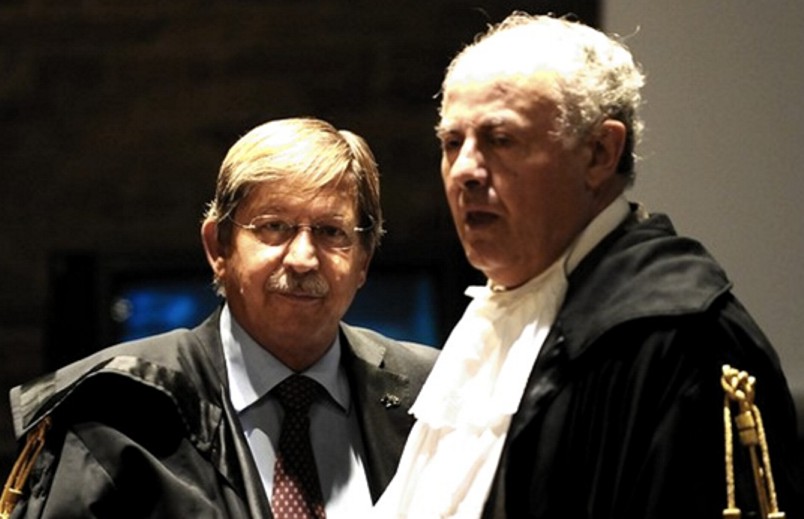
[Above: The indomitable victim’s proponent Giuliano Mignini preparing for court today with Giancarlo Costagliola]
Click the image above for Andrea Vogt’s report on Mr Mignini’s afternoon in court. Tough points Mr Mignini made:
“They know the truth because they were at Via della Pergola along with Rudy,” said Prosecutor Giuliano Mignini said emphatically, pointing to Knox and Sollecito in his last remarks to the court. “Not only the young man of color should pay.”...
[Mr Mignini] sometimes seemed to obsess on small and bizarre details, but at other times showed an incredibly effective use of courtroom oratory. Just before showing the jurors gruesome autopsy photos of Kercher’s wounds, for example, he told them softly how he would never forget “the wide open eyes of the victim and the composed, immense pain of her parents.”
He reminded the appeals jurors that it was not a U.S. court, but rather one in the Italian republic and urged them to ignore “improvised detectives who give their superficial opinion from 10,000 kilometers away.”...
[Mr Mignini] went over all the witness testimony, described how a break-in in the apartment Kercher and Knox shared had been staged and frequently cited Knox’s own statements on the stand during her first trial, especially on the topic of a large drop of Knox’s blood on the bathroom faucet and mixed traces of blood and DNA of Kercher and Knox in the bathroom.
Highly worth reading the entire thing. Barbie Nadeau covers the same ground equally well in the Daily Beast and notes that today could be the final scene changer. The embattled Sollecito defense counsel Giulia Bongiorno was reduced to making this preposterous claim:
Sollecito’s attorney Giulia Bongiorno told reporters that Mignini was desperately clinging to old arguments because the independent experts’ report had demolished two key pieces of evidence : a knife and a bra clasp.
Demolished?! The independent experts didn’t retest the DNA material with modern techniques when they could and should have and they even admitted that was Meredith’s DNA profile the scientific police had produced the first time around.
They ended up looking weak and evasive. Hardly the silver bullet Bongiorno wants.
By the way, no sign of Mr Mignini being fazed by the presence (surely unhelpful to Knox and her lawyers) of the muddled “ex FBI agent” Steve Moore whose bizarre and often defamatory takes on the case and Italian justice officials we have again and again shown to be wrong.
Perhaps Mr Mignini should ask Steve Moore to publish his own detailed resume. So far, all requests for it have been stonewalled.
Thursday, September 22, 2011
Reflecting On Andrea Vogt’s Fine Report “Knox: Innocent Abroad Or “˜Getting Away With Murder’?”
Posted by Skeptical Bystander

Cross posted from my personal blog. Please click the image above for Ms Vogt’s new piece.
In this intelligent and well-written piece, Andrea Vogt wonders aloud how Italians would react to an acquittal of the Seattle woman who was convicted in December 2009 of taking part in the killing of her roommate, Meredith Kercher. She notes that an acquittal would be cause for celebration in Seattle.
It would certainly be cause for celebration among those who have taken up the cause and believe in Knox’s innocence despite the compelling evidence of her involvement in this horrific crime. But the fact is, most people in Seattle are simply not that interested. And among those who are, the consensus is certainly not that an innocent abroad got railroaded.
If it seems so, it’s because the local media has dutifully followed the lead of the national media and adopted the “innocent abroad” narrative concocted by David Marriott, whose PR firm was hired to manage Knox’s image shortly after she was arrested. In Seattle, Meredith’s murder has been played as a human interest story in which only the local protagonists matter. Meredith was British; it is assumed that Seattleites could not possibly give a toss about her.
Hence, local coverage has favored news of fundraisers for the accused local woman and then for the convicted local woman. Questions from local journalists to her supporters (family) have ranged from “How is she holding up in prison?” to “How is she holding up in prison?” And since there is no guilter movement, local or otherwise, except in the minds of a few shrill locals, there has been no local coverage of the movement’s “activities”. How can a non-existent movement have activities?
I have met many people in West Seattle who quietly shake their heads in disbelief at Steve Shay’s coverage for the West Seattle Herald. Yesterday, someone who works at a local business said “you’re skeptical bystander” when she handed me back my credit card. She told me she was a long-time lurker who reads perugiamurderfile.org and TJMK every day for information about the case. There are many people like her in Seattle.
I found it amusing, though sad, to read the comments that follow Andrea Vogt’s thoughtful piece for the First Post. Naturally, loud vocal supporter “Mary H” (this is her online pseudonym, and hiding behind it may be one reason she is so loud on the internet) was quick to condemn Vogt for merely pointing out the obvious. Mary H (fake name) asked Andrea Vogt (real name) how she could sleep at night!
It ain’t that hard, Mary, when you have the courage of your convictions and when you stand by the facts rather than getting sidetracked by the cause.
The fact at hand is that many people—in Seattle, in Italy, and elsewhere—would come away from an eventual acquittal with the feeling that justice had not been done for Meredith Kercher and her family and that at least two of those responsible for her death had gotten away with it. Mary H and others may not like to hear this, but it is a fact. And no amount of shaming on the part of Mary H or anyone else is going to make a bit of difference.
Yesterday, a lawyer friend and I were musing about what would have happened had this case been tried in the US. Many Knox supporters have said, repeatedly, that it would never have gone to trial here. My lawyer friend agreed, but for a different reason than the one implicit in this view (i.e. that there is supposedly no evidence). He said
I don’t think the case would have gone to trial in the US. First, they would not have had to stop questioning her when they did. They would have artfully gotten her to waive her Miranda rights. They would have told her they can’t help her unless tells her side of the story, been very sympathetic initially and built up her confidence that she could talk her way out of it. They would eventually hone in on the inconsistencies, and when she finally cracked there wouldn’t be a lawyer there to stop her. The death penalty would have been on the table, and her only sure way to avoid that would be to plead guilty in exchange for life.
He also thinks that this would not have been such a high-profile case had it happened in Seattle.
Let’s wait and see how this court weighs the two contested items in the overall scheme of things. As a poster on PMF (another lawyer) wrote last night, it all boils down to this: How many pieces of evidence… ‘consistent with, but not conclusive of’ guilt can stack up against someone before, as a matter of common sense, it is no longer reasonable to believe they are innocent?
Sunday, June 19, 2011
Current Court Reporting: Seattle Post Intelligencer Still Posts The Best, Least Bias, Most Detail
Posted by Peter Quennell

[Above: Seattle waterfront just north of downtown - Seattle PI building is at front center with globe]
Witness Andrea Vogt’s excellent report on the proceedings today in Appeal Court.
1). On the assorted criminals testifying today.
The dramatic day of testimony, requested by the defense, brought together a gang of criminals of whom Hollywood scriptwriters could only dream, including a convicted rapist and childkiller, a mafia snitch and other hardened long-timers with little to lose.
Their riveting testimony (complete rubbish or explosive and key new revelations, depending on your point of view) led jurors down some of Italy’s darkest alleys, from the desperate gangster neighborhoods of Naples to the powerful masonic lodges of Umbria and tough Italian prison wards with their own code of honor….
Only one of the five had no connection to Sicily or Naples and that was a Romanian who claimed on the stand that his signature had been forged on a document presented by the defense and that he knew nothing about anything….
2) On the testimony of Mario Alessi
Alessi took the stand around noon, after a sharp drop in his blood pressure required a nurse’s attentions (the stress of testifying had caused him to lose 15 pounds over he last 10 days, his lawyer told seattlepi.com). Alessi said he earned Guede’s trust while they were incarcerated together.
One day, Guede took him by the arm and led him to a corner of the prison yard where they would be out of view of closed-circuit cameras, he said. Then, Guede told him that the real truth was that a drunkard who had gone to Kercher’s flat with Guede from the disco had sexually assaulted her and then killed her to avoid “rotting in prison” for the rape….
Toward the end of Alessi’s story, the lawyer for Meredith Kercher’s family, Francesco Maresca, branded him a repeat liar. Maresca held up a photo of “Tommy,” whose high-profile disappearance and slaying in 2006 shocked Italy…. In response to the photo of Tommy, Alessi said no, he didn’t recognize the boy, to which Maresca said, “That’s OK, we do.”
3) On the testimony of Luciano Aviello:
But on the night of Kercher’s murder, Nov. 1, 2007, Aviello testified, his brother came home with a ripped, bloodied jacket and was covered in scratches on his arms. He eventually said he had stabbed a young woman after surprising her during a break-in to steal a painting, Aviello said…
The brothers had then hidden the murder weapon and keys to the house in a nearby wall and covered the hole with mortar. “Go and see for yourselves. Verify it! You’ll find I am telling the truth,” said Aviello. “Amanda Knox and Raffaele Sollecito are innocent.” Police and prosecutors have never publicly confirmed that such a search was done. Aviello’s brother’s whereabouts are unknown.
When prosecutors asked him about his connection to Alessi and the other cons, Aviello took offense, saying he had nothing to do with those “pedophiles and rapists,” but was rather just an “honest” gangster from Naples doing time for routine organized crime.
Toward the end, Aviello’s testimony grew increasingly aggressive toward prosecutors and police with whom he had collaborated. At one point guards held his shoulders as he yelled accusations through the gap where two front teeth should be. “You are a klan, not the judiciary!” he yelled.
4) And on the prosecution’s many new rebuttal witnesses.
... the court agreed to call a number of counter-witnesses requested by the prosecution, including two more prisoners and two police officials. The court also agreed to hear Giacomo Benedetti, the friend of Rudy’s whose Skype conversation with Guede while Guede was on the lam in Germany led to his arrest, as well as Guede himself.
Monday, April 18, 2011
Three Excellent Websites Commenting On The Case That We Have No Connection With
Posted by Peter Quennell
TJMK has cross-posting relations with Miss Represented, and Peter Hyatt, and several other objective websites on Meredith’s case.
These below are three careful, objective websites we’ve had no connection with, but admire. Click on the images to get to them.
____________________________________________________________________________________________
____________________________________________________________________________________________
Tuesday, April 05, 2011
The Precise And Accurate Italian Wikipedia Article On Meredith’s Case, Now Translated Into English
Posted by Tom M and Skeptical Bystander
A recent post on TJMK by Gwaendar refers to Wikipedia and the current effort by the Fictitious Friends of Amanda to make her the focus of an article that has so far been devoted to the Murder of Meredith Kercher.
The Eclectic Chapbook blog often comments on the case. It has called this effort “tragically misguided and possibly somewhat demented,” describing it as an instance of “the Enchanted Glen Phenomenon, which is a psychological space wherein normal laws do not apply and all rules are magically suspended. “
We have now examined and translated the Italian Wikipedia article which was written in a space where the normal laws certainly are applied and no rules have been suspended.
The main reporting and the voluminous records of the trial and the appeal are of course all in Italian, and Italians on the whole have a far better grasp of events and the legal context than do most observers in the US and the UK. Because there is so much source material, and so little misleading reporting, it would seem that If any Wikipedia in any language in the world is going to describe the case correctly, it will be the Italian one.
This translation below of most of the Italian Wikipedia article is not word-for-word, but it is intended to convey the substance of the Italian article as it would have been if originally written in English.
The index, the sections on books and movie, and the citations were omitted.
The murder of Meredith Kercher, an English student in Italy enrolled in the Erasmus program at the University of Perugia, occurred during the night of November 1, 2007. Meredith was found lifeless, with her throat cut, in her bedroom in the house she shared with other students in Perugia. The cause of death was hemorrhage due to bleeding from a wound to the neck caused by a sharp object used as a weapon.
Two men and a woman were convicted as a result, of murder, sexual violence and theft.
Biography
Meredith Susanna Cara Kercher was born December 28, 1985 in Southwark, London, lived in Coulsdon, and was a student at the University of Leeds, where she was pursuing a degree in European Studies. She enrolled in the Erasmus program, and had arrived in Italy in September 2007 to complete her degree in European Studies.
Details and circumstances of the murder
Kercher was murdered at night between 1 and 2 November 2007, in the apartment she shared with three other young women, two Italian and an American, who were away that night. Based on the first examination of the autopsy, the pathologist who handled the case ruled that the death occurred between 22:00 and midnight on that day.
The following morning an elderly woman living near Via della Pergola where Meredith’s body was found, alarmed by the discovery of two abandoned mobile phones, called the police. From information obtained from one of two mobile phones the Postal Police of Perugia sent agents to the house of Meredith Kercher. On their arrival the police found Amanda Knox (Seattle, USA, July 9, 1987), Meredith Kercher’s flatmate, and her Italian friend, Raffaele Sollecito (Giovinazzo, March 26, 1984), with whom she had recently started a relationship, outside the house.
The two young people said they were awaiting the arrival of the police; when asked why, they said they had found a window broken, the door open, and suspected a theft. Later, these claims were questioned by investigators, given that the Police Post arrived at the house on Via della Pergola at 12:35 and telephone calls to the Police were not made not until 12:51 and 12:54. Entering, the Police found the bedroom of Meredith Kercher locked and decided to break down the door. Upon entering, they found a number of bloodstains, the room in disarray, and a foot sticking out from under the duvet which had covered the bed.
The Convicted:
The three convicted at the first stage are:
- Raffaele Sollecito, who was born in Giovinazzo (BA), a university student of 23 years at the time of the murder;
- Amanda Knox, a student originally from Seattle, U.S., 20, who had a relationship with Sollecito at the time of the crime;
- Rudy Hermann Guede, born December 26, 1986 in the Ivory Coast, was arrested in Germany on November 20 and extradited to Italy on December 6, 2007. At his lawyers’ request, Guede received from the court at a preliminary hearing an order granting expedited trial.
Knox and Guede were detained in Capanne prison, a 20-minute drive from Perugia. Sollecito, after also being held in Capanne, was transferred in early 2008 to the Vocabolo Sabbione prison in Terni.
The case also, initially, erroneously involved Patrick Lumumba, owner of the restaurant where Amanda Knox worked; her statement placed him at the crime scene on the night of the crime. The charges were later proved unfounded and demonstrated the unreliability of Knox as a witness. Implicating the Congolese man was also an incorrect translation of a text message sent to him in English by Knox (‘see you later’, which rather than a generic “Ci vidiamo,” was translated literally as “we will see each other later”[“ci vidiamo dopo”].
Thus, police thought that the two had an appointment for the evening of the crime). Patrick Lumumba was ultimately released and all charges against him were dropped. Following the unjust detention lasting 14 days, Lumumba was awarded € 8000 as compensation, but this was deemed inadequate by his lawyer, who threatened to sue.
The Sentences
Knox, Sollecito and Guede were sentenced respectively to 26, 25 and 16 years in prison. Rudi Hermann Guede opted for an abbreviated trial and his conviction for complicity in murder and sexual violence was made final by the Court of Cassation, First Criminal Division, on December 16, 2010. For the other two participants, the case is on appeal. The decisions reconstruct in detail the manner and circumstances of the murder, a motive defined “violent, sexual, erotic.”
The conviction in the first trial of Sollecito and Knox, issued by the Court of Assizes of Perugia, is based on numerous expert opinions, objective evidence and testimony.
According to the reconstruction regarding Knox and Sollecito, on the evening of November 1, 2007, they met in piazza Grimana, where they had occasionally met Guede, an acquaintance of Knox, who decided to join them for the evening. They decided to go to Knox’s house, to which her roommate Meredith Kercher, after an evening with her English friends, had just returned. Kercher’s bedroom door was presumably ajar, and upon entering the house the three defendants immediately noticed her presence.
Going directly to another part of the house, Knox and Sollecito made love. Guede, shortly after, went to the bathroom, where he left organic residues in the water of the toilet, as found in the investigation. According to the reconstruction, Guede left the bathroom, probably excited by the sounds of Sollecito and Knox making love, noted again the door ajar at Kercher’s room, and decided to approach. Then he entered Kercher’s room; but after her refusal, he became violent, attempting to rape her.
Kercher’s cries led Knox and Sollecito to go to her room, where they joined Guede’s criminal action, finding it an “exciting situation.” While the Guede violated Kercher, Knox and Sollecito tried to immobilize her: to do this Sollecito and Knox wielded knives to threaten the victim. The analysis shows that the knife wounds by Sollecito were probably quite small, while Knox wielded a kitchen knife, later found, and on which were found genetic traces of her mixed with those of Kercher.
The situation then deteriorated, partly because of the screams and resistance of Kercher: Knox then, with the kitchen knife, struck the victim in the neck, causing fatal injuries. The three defendants, shortly after the murder, fled with Kercher’s phones, fearing that if someone called her and got no response, they would be suspicious and the crime would be discovered: the cell phone was ultimately found in an embankment a few hundred meters from Kercher’s house.
Then they headed in different directions: Guede to a nightclub, Knox and Sollecito to the latter’s flat. The next morning Knox and Sollecito tried to clean up the crime scene and clean up their tracks; then they broke a window in the house to stage a mock burglary, hoping to throw the investigation off course.
Guede’s Supposed Confession
In March 2010 rumors spread of an alleged confession by Rudy Guede. The facts are as follows: it seems that Guede had revealed his complicity, with a friend, in killing Kercher, to Mario Alessi, an inmate housed in the same prison, a character already known to police and media for the murder of little Tommaso Onofri, Guede had invited Kercher to go to a party, she refused, and subsequently the friend of Guede tried to rape her. According to Alessi, Guede tried to come to Kercher’s aid, and Guede’s friend rebuked him, saying that he should just strike the final blow to end the girl’s misery, which is what Guede did.
Then Guede and his friend met again by chance in a nightclub, and Guede’s friend gave him money to flee to Germany, where he was at the time of the extradition and return to Italy for arrest. This reconstruction, which would completely exonerate Knox and Sollecito, was found by investigators to be totally unfounded.
Friday, March 18, 2011
John Follain Foreign Correspondent UK Sunday Times Chats Online About Case And Italian Politics
Posted by Peter Quennell
Transcript of a live online Sunday Times discussion with foreign correspondent John Follain on Monday 7 March 2011.
Sunday Times Foreign Editor:
Welcome to John Follain, foreign correspondent for The Sunday Times who has covered Italy since 1998. He has written a book about the murder of Meredith Kercher which is out in August. So let’s begin, John is waiting for your questions
John Follain:
Hello, all set and looking forward to your questions - about the Kercher case, Berlusconi or anything you see fit to throw at me
[Comment From James Ellington]
Hi John, How do you think Amanda Knox managed to gain celebrity status given the gruesome nature of the crime she has been convicted of?
John Follain:
Hi James,
Should we blame the media or the readers? Seriously, I think one big reason why this case has interested people is that they identify themselves with the parents of Meredith Kercher, or of Amanda Knox.
As for Amanda Knox being a celebrity, I’d say the twists and turns of the investigation and the trial have a lot to do with it - as well as her looks and the fact that it has to be a rarity to have an American exchange student with such a background being convicted (the appeal trial is now on, of coruse) of such a crime.
[Comment From Freddy: ]
What do you make of the film? It doesn’t seem to have gone down too well with anyone involved
John Follain:
Hi Freddy,
Having covered so many of the events, it was very moving to see some of them on screen - the actors do look very much like the real protagonists. But I did find it peppered with inaccuracies and callous in its depiction of events just before Meredith’s death - including a completely unbelievable scene showing Rudy Guede embracing Meredith.
[Comment From Rebecca Ward]
So let’s cut to the chase, do you think Amanda Knox to be guilty or has she been wrongly convicted? And what do you base your opinion on?
John Follain:
Hi Rebecca,
Ah, thought that one would come up. Under Italian law, Knox’s conviction doesn’t become definitive until she has exhausted her chances of appeal - meaning the current appeal trial and a possible Supreme Court trial.
Having said that, I do think she played a role in the murder, along with her boyfriend Raffaele Sollecito and Rudy Guede. That’s an opinion based on the evidence against her including the staged burglary, the DNA samples involving all three, and her behaviour at the police station
[Comment From Suzanna, Gloucs]
I have read that Guede was able to elect to go down the “˜fast track’ route for trial. What is that? Sounds like a McDonalds version of the law?
John Follain:
Hi Suzanna,
Not McDonalds but the Italian equivalent of plea-bargaining in a way. The fast track route involves a defendant agreeing to a faster trial, with fewer witnesses and no jury among other conditions, in exchange for a lower sentence if convicted.
But there’s no doubt many in Perugia and elsewhere have been shocked by his final prison sentence of 16 years, which will be greatly reduced for good behaviour among other factors.
[Comment From JJ ]
Can Knox be thought of as credible when saying she had been assaulted and asked questions under duress when being interviewed in light of the Facebook comments and images of swords and rituals?
John Follain:
Hi JJ,
I think it’s hard to accept that she accused an innocent man - Patrick Lumumba, the owner of the bar where she worked - simply because the police supposedly “pressured” her into doing so.
When she appeared in court and was questioned at length by the prosecutor over this, she didn’t come up with a convincing explanation. Plus there’s the fact that the day after the police interrogation, she repeated the scenario of Lumumba killing Meredith at the cottage.
[Comment From Charles and Jane]
I’ve seen interviews with Knox’s parents ““ difficult not to make assumptions here ““ but they seem rather unhinged (especially the mother). I realise it is not the everyday situation you find yourself in re your children but I think they do AK rather more harm than good?
John Follain:
Hi Charles and Jane,
To be honest, no, I don’t think they’re unhinged. I spent more than three hours interviewing them and AK’s sister Deanna in Seattle, and they came across as determined to bring Ak back from Perugia.
As for them doing AK more harm than good, the massive PR campaign they launched didn’t go down well with at least one of her Perugia lawyers, and it has backfired with the courts in the sense that judges in Perugia think the attacks - especially against prosecutor Giuliano Mignini are unjustified.
[Comment From james forrest]
What was the greatest challenge you faced in writing your book and did you meet any of the people connected with the case during the course of your research? Would you be interested to interview Knox if you had the chance? What question would you most like to ask her if you had the chance?
John Follain:
Hi James,
I set out to re-construct events from the moment Meredith and AK arrived in Perugia, through the murder and the subsequent investigation, right up to the current appeal trial - as much as possible describing not only what the main characters did but also what they thought at the time.
So the challenge was obtaining numerous, repeat interviews - one was six hours long - with as many of the characters including the prosecutors, detectives, lawyers, experts, relatives and friends among many others.
Yes of course, which journalist who has followed the case wouldn’t like to interview AK? But she is banned from giving interviews as long as her conviction, or acquittal, hasn’t become definitive. I don’t have a top question for her, what I would like is to ask her to go through events in as detailed a way as possible.
[Comment From Peter Polites]
What do you expect to be the outcome of the Amanda Knox appeal which has been delayed so forensics can carry out a review of the evidence used to convict her? When do you think we will hear the result? And do you think there is the possibility that the forensic evidence was contaminated?
John Follain:
Hi Peter,
Given that more than 20 judges have so far ruled that AK is guilty, I think the appeal court will head the same way - although it could reducer both the sentences for both her and Sollecito.
But no thinks the outcome is certain - the key hearing will be in late May when the court-appointed experts report back on their review of the DNA evidence found on the kitchen knife believed to be the murder weapon, and on Meredith’s bra clasp in her bedroom.
Yes contamination is in theory always possible but I see nothing to indicate that happened here.
[Comment From Ivor Gibson]
There have been heaps of books published about the case of Amanda Knox ““ what does yours do that the others don’t?
John Follain:
Hi Ivor,
I hope that my book offers the fullest-possible account of the case - I hope the reader will feel he or she are with Meredith and her friends in her last weeks in Perugia, behind the shoulder of the prosecutor or the detective as they make their discoveries, with AK and her mother as they talk in prison, and present in the courtroom at the key moments of the trial.
[Comment From Sammy]
what is the reaction of the average Italian to the bunga bunga scandal? disgust or secret envy?
John Follain:
Hi Sammy,
If you believe Berlusconi, 51% are for him, and 49% are against him. The truth is the average Italian does think the scandal is pretty awful but that doesn’t stop a big minority - a majority if you include his coalition partners - thinking Berlusconi is the best man for the job right now.
Basically the Left has yet to persuade anyone apart from diehard followers that it does have a programme for government and can rule the country efficiently.
[Comment From Elise Crothers]
I read that Berlusconi thinks he can prove in court that Karima El Mahroug was not underage when he allegedly paid her for sex ““ what do you think will be the outcome of his trial in Milan next month?
John Follain:
Hi Elise,
The prosecutors are confident that Berlusconi’s claim that she wasn’t underage will be thrown out by the court - her date of birth is on her Moroccan passport and as her father points out, they wouldn’t have spent such a long time trying to get her into community centres for minors if she was an adult.
The outcome is a very tough one to predict, but one near-certainty is that Berlusconi won’t try to stop the trial going ahead. He wants to fight his corner in court by attending all the hearings.
If he is convicted, he would most likely get a suspended sentence because he is over 70 and because he has a clean record.
And if he is convicted, he has said he will stay on as prime minister.
[Comment From jude]what does Bunga Bunga mean? I think I know but do I?
John Follain:
Hi Jude,
I think I know too, but only on the basis of what Ruby told prosecutors before the whole scandal became public.
And that’s second-hand, in that she said that Berlusconi told her that it was something copied from Gadaffi’s harem - ie. an orgy.
But then again, Berlusconi’s people have claimed it’s no such thing but just a joke about two ministers on an island who come to an obscene end with natives (don’t ask).
And the newcaster Emilio Fede, who is accused of aiding and abetting prostitution for bringing showgirls to Berlusconi’s home, said it was the name of the sofa
[Comment From Mary]
How can you stay on as Prime Minister if you are convicted?
John Follain:
Hi Mary,
A prison sentence of three years or more would automatically include Berlusconi being barred from holding public office for a year or more. But that wouldn’t become definitive until the case was ruled on by the Supreme Court, which could be in a couple of years or more.
[Comment From Simon Kennedy, Edinburgh]
Last year Berlusconi fawned over Gadaffi, treating him like royalty on his visit to Italy and has also described him as “my great friend”. Now they seem to have changed direction due to the threat to their energy supplies. Should Italy take a stand against Gadaffi and what would this mean for the Italian economy?
John Follain:
Hi Simon,
Despite Berlusconi’s previous “friendship”, and embarrassing scenes including Gadaffi being allowed to lecture young women - all from a PR agency - bussed in to attend his lecture on “Islam”, Italy says it will stick to whatever the EU and the UN decide on sanctions.
But it’s been noticeable that Libya’s interests in Italy - there’s even a stake in the Juventus soccer club - have gone untouched officially because they’re not held by Gadaffi himself or his clan.
The trouble for Italy is that taking too strong a stand against Gadaffi could threaten vital energy supplies.
And the Italians are quick to point out that they were not alone in giving Gadaffi red-carpet treatment.
[Comment From Gemima9]
how will Italy cope with the thousands of North African migrants arriving in the country after the unrest in the middle east?
John Follain:
Hi Gemima,
The government hopes it won’t be alone in coping and that other EU countries will step in, because it simply doesn’t have the facilites to cope with the possible arrivals - some estimates are around 250,000 to Italy alone.
The emergency plans drawn up by the government including using converted barracks to house them but this would all be temporary. And the UN High Commissioner for Refugees has regularly criticised the way Italy has been dealing with previous cases, saying it doesn’t give them a proper chance to claim and obtain refugee status.
Sunday Times Foreign Editor
Well, that’s all we have time for folks. Thank you for all the questions. Thanks to John for giving us his time. Do tune in next week at the same time for another heavy-weight topic. Have a good week. Bye.
John Follain:
Thanks to you all for your interest, and hope we get another chance to talk soon.
According to a BBC report Bunga Bunga is the nickname of Greman actress Sabina Began who organizes Mr Berlusconi’s controversial parties. Therefore “bunga bunga parties”.
Not everybody is buying that explanation it seems. Other versions keep surfacing.

